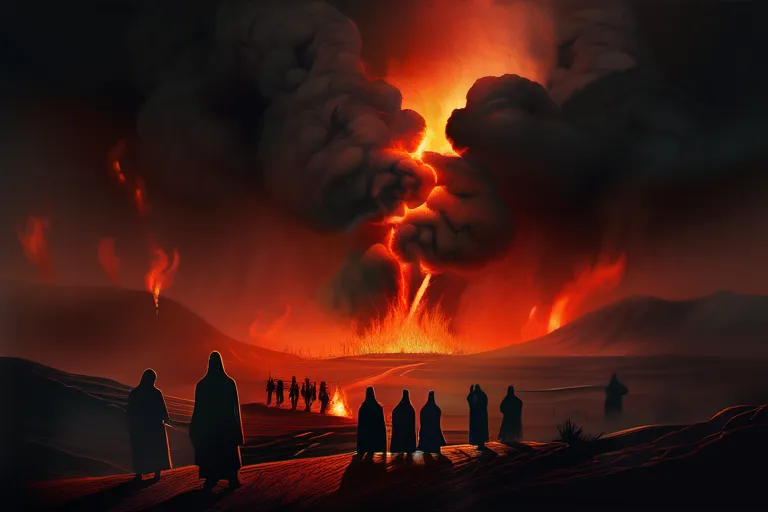Explore the beliefs, punishments, and paths to redemption in Islamic eschatology.
Delve into the intricate concepts surrounding Muslim hell, a crucial aspect of Islamic eschatology. This article will provide an in-depth exploration of the beliefs, punishments, and paths to redemption associated with this concept.
The Islamic Concept of Hell
How does one even begin to explore the Islamic concept of hell? It’s a topic that often evokes fear and dread, but understanding its role in Muslim eschatology can provide clarity and insight. Imagine hell as a vast, dark abyss, much like the depths of a stormy sea, with waves crashing endlessly against the shores. In this metaphorical sea, each wave represents a different punishment or trial, meant to test the soul’s resilience and faith.
But where did this concept come from? The origins of hell in Islamic tradition are deeply rooted in early revelations and interpretations of Quran. Imagine the first Muslims, standing on the shores of Mecca, looking across at a horizon filled with clouds of doubt and fear. These early believers received warnings about an afterlife where righteousness would be rewarded and vice punished. The concept of hell was not just a distant warning but a tangible reminder of the consequences of sinful actions.
How does this compare to other religious traditions? While many faiths have versions of hell, the Islamic version often emphasizes accountability and personal responsibility. This is akin to walking through a maze where every turn reveals a new challenge or temptation. Unlike some other belief systems that might view hell as a place of eternal torment with no chance for redemption, Islam presents a path toward forgiveness and mercy.
The development of this concept over time shows how it evolved from its early roots into a complex system of beliefs and practices. Just as a river carves through stone, so too did the passage of time refine the Islamic understanding of hell, making it more nuanced and rich in detail. This evolution allowed for a deeper exploration of human nature and the consequences of our choices.
Punishments in Muslim Hell
When delving into the concept of Muslim hell, it’s essential to understand that it is not merely a place of eternal torment. Rather, it serves as a profound test and a reminder of God’s ultimate justice and mercy. Imagine hell as a metaphorical mirror reflecting the sins and misdeeds of its inhabitants. These punishments are both retributive and corrective, designed to cleanse souls and ensure they are ready for the afterlife.
According to Islamic teachings, there are various forms of punishment in hell, each tailored to the specific nature of one’s wrongdoing. For instance, sinners who engaged in dishonest business practices might find themselves in a boiling pool filled with molten copper. This fiery bath serves as a constant reminder of their greed and deceit, making it impossible for them to escape until they have atoned fully.
Another form of punishment involves the ‘scales of judgment.’ Here, one’s deeds are weighed against their faith and good actions. Those whose sins outweigh their virtues find themselves bound in chains or forced to walk on thorns. The duration of these punishments can vary greatly; some souls may be freed sooner if they show genuine remorse and seek forgiveness.
The concept of “rewards” within punishment is a unique aspect of Muslim hell. For instance, those who are punished by walking on hot coals might find that their feet eventually become hardened like iron, allowing them to walk without pain. This serves as a form of spiritual growth and eventual redemption.
The severity and duration of these punishments often depend on the nature of one’s sins and whether they sought forgiveness before death. Those who truly repented may experience shorter periods of punishment or even have their sentences reduced through the mercy of Allah. However, the primary goal is always to learn from past mistakes and strive for a better existence in both this world and the next.
Understanding these punishments helps Muslims appreciate the importance of righteous living and seeking forgiveness. It serves as a powerful reminder that every action has consequences, and true piety involves not just outward adherence but inner transformation. In this way, even the darkest corners of hell can become a path towards enlightenment and ultimate reconciliation with God.
The Paths to Redemption
Can forgiveness truly exist beyond this mortal life, especially after committing grave sins? In Islamic eschatology, the concept of repentance (tawbah) and forgiveness is a beacon of hope for those who have strayed. It’s like being lost in a vast, dark forest; repentance provides the light that can guide you back to safety.
The path to redemption in Islam is not merely about confessing sins but deeply involves sincere remorse and a commitment to change. “Indeed, God loves those who strive [continuously] for His cause, making great efforts in sincerity.” (Quran 3:142) This verse emphasizes the ongoing nature of effort required to mend one’s ways.
Forgiveness from Allah is a profound concept. While humans may find it difficult to forgive certain transgressions, Allah’s forgiveness is boundless and inclusive. He has promised that those who seek His forgiveness with sincerity will be forgiven (Quran 2:173). It’s as if one is standing at the edge of a precipice; reaching out for Allah’s mercy can bring you back from the brink.
The process of repentance involves several steps. First, acknowledging and recognizing the sin is crucial. Next, making a sincere apology to those affected by the actions. Finally, resolving not to repeat the same mistakes in the future. Each step is like laying down a path that gradually leads away from darkness into light.
Those who seek redemption must also be mindful of their intentions. “Indeed, Allah does not change the condition of a people until they change what is in themselves.” (Quran 13:11) This means personal transformation is key. It’s as if one has to rewrite their story, starting with a clean slate.
The journey towards redemption is complex and multifaceted, involving both inner reflection and external actions. Just as a shipwrecked sailor must construct a raft from available materials, individuals facing spiritual crises must find ways to rebuild their lives based on faith and righteousness.
The Role of Good Deeds in Avoiding Hell
The role of good deeds in avoiding hell is a profound and intricate concept in Islamic teachings. Could it be that simply doing good can shield us from the flames? In a world where sin and vice seem to hold sway, the importance of good actions becomes a beacon of hope for believers. These deeds are not just about religious practices like prayer or fasting; they encompass every aspect of life—from helping the needy to treating others with kindness.
Imagine the universe as a vast garden where paths lead either to serenity or chaos. Good deeds pave the way towards peace and tranquility, while neglecting them can plunge one into turmoil and despair. In this metaphorical garden, the act of charity is like watering flowers, ensuring that the spirit remains lush and vibrant. Conversely, indulging in vices is akin to allowing weeds to grow, choking out the light.
The Prophet Muhammad (peace be upon him) emphasized the importance of these deeds through his teachings. He stated, ‘He who believes in God and the Last Day should do good actions; he who believes in God and the Last Day should speak justly; he who believes in God and the Last Day should look at people with a good eye.’ This highlights that every deed matters, no matter how small or insignificant it may seem.
Moreover, the notion of good deeds as a shield against hell is not just about avoiding punishment; it’s also about achieving a higher level of spiritual enlightenment. In Islam, good actions are seen as a means to draw closer to God and receive His mercy. The Prophet said, ‘The believer does not do an action for which he will be rewarded except that there is some reward in it.’ This encourages believers to strive for excellence in all their deeds.
By integrating these teachings into our lives, we can navigate the complexities of existence with a clearer conscience and a deeper sense of purpose. The path to avoiding hell isn’t just about fear; it’s about embracing a life filled with meaning and righteousness. In this journey, every good deed is not only an act of piety but also a step towards a better future—both in this world and the next.
The Day of Judgment and Muslim Hell
The Day of Judgment looms like an inevitable storm on the horizon, casting shadows over every soul’s path. In Islamic eschatology, this event is not merely a distant concept but a vivid reality that shapes every moment of our existence. How do Muslims perceive this day and its connection to hell? Is it just a place of eternal torment, or does it hold deeper lessons for the faithful?
Hell in Islamic teachings serves as a stark mirror reflecting the choices made in life. It is not merely a physical realm but also a spiritual state—akin to a burning coals that consume one’s soul if left unchecked by good deeds and righteous actions. The inhabitants of hell, according to Islamic texts, are those who have ignored the signs of God, rejected His prophets, and clung to sin and falsehood.
The punishments in hell are not just physical torments but a relentless reminder of one’s failures and sins. Fire, which symbolizes the intensity of spiritual burning, is used metaphorically to describe the pain of remorse and regret that haunts those who refuse redemption. The severity of these punishments underscores the seriousness with which Islamic teachings view the consequences of wrongdoing.
However, it’s crucial to understand that hell is not a predetermined fate for all. The Quran emphasizes paths to reconciliation and redemption even in the most dire circumstances. Souls can still seek forgiveness through sincere repentance, good deeds, and seeking guidance from the divine path. This belief in the possibility of change and improvement offers a ray of hope amidst the daunting imagery of hell.
So, how do these concepts shape one’s approach to life? Do they instill fear or inspire a sense of purpose and righteousness? The Day of Judgment is not just an end but also a beginning—a call for introspection and moral integrity. It serves as a constant reminder that every action has consequences, and the choices we make today can determine our destiny in the hereafter.
Reflecting on these concepts, it becomes clear that understanding hell in Islamic theology goes beyond mere fear. It is a profound tool for shaping behavior and cultivating virtues. The knowledge of this day serves as a catalyst for ethical living, encouraging Muslims to lead lives of compassion, justice, and piety.
The Impact of Beliefs on Daily Life
How do beliefs about Muslim hell shape the daily lives and behaviors of Muslims around the world? Is it a constant reminder, an ever-present cloud that hangs over every decision we make? Or is it more like a distant mountain on the horizon, something to be aware of but not dwell upon?
Many argue that these beliefs serve as powerful motivators for righteousness. They ask, ‘How can I live my life if I am constantly thinking about facing eternal punishment?’ This fear can drive individuals to adhere strictly to sunnah and avoid sins deemed by Islam to be grave. For many Muslims, the concept of hell is a stark reality that keeps them on track with their religious duties and moral values.
However, this perspective is not uniform. Some believe that the fear of hell should not overshadow other aspects of faith like compassion and charity. They might ask, ‘Is it just about avoiding punishment or can we find redemption in our daily actions?’ This tension highlights the complexity of how different individuals interpret their beliefs.
Moreover, the belief in a day of judgment and the existence of hell can also influence social interactions. Muslims are often reminded to be kind, generous, and just towards others because these good deeds could potentially lighten their burden on the Day of Judgment. This leads to a society where communal values and cooperation are highly valued.
But how does this translate into personal behavior? Do people really live in constant fear or do they find balance by focusing on the positive aspects of faith? The answer may vary from person to person, but one thing is clear: these beliefs profoundly impact the way Muslims approach their lives and responsibilities.
Conclusion
 In conclusion, understanding the concepts of Muslim hell serves as a reminder of the importance of leading a virtuous life according to Islamic teachings. By exploring these ideas, we can gain valuable insights into the beliefs and practices of Muslims worldwide.
In conclusion, understanding the concepts of Muslim hell serves as a reminder of the importance of leading a virtuous life according to Islamic teachings. By exploring these ideas, we can gain valuable insights into the beliefs and practices of Muslims worldwide.











